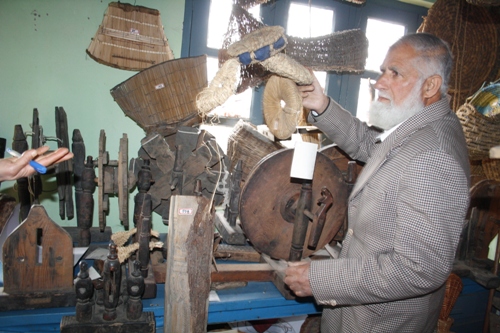An ethno-botanical museum at Islamia College in Srinagar houses rare items but official neglect is spoiling the valuable collection. Ikhlaq Qadri reports

An Ethnographic Museum at the Islamia College of Science and Commerce Srinagar, housing many of the now extinct or less prevalent items of wood, wicker-work and hay is helping their preservation and giving an easy access for people to know about their household and other items used by Kashmiris in the past.
“There are around 650 rare items which are almost extinct in the present day world. All ethno-botanical items collected till date have been identified, numbered and labelled with a note mentioning the date, place of collection and its utility. These have been arranged in the categories of wood, or wood products, wicker-work items and straw and hay grass items,” said Dr. Abdul Majeed Kak, curator of the museum.
The items in the museum are Tila Vane Wan ( OX driven wooden machine), Gurus Dhoon (churners), Ala Banae ( wooden plough), Cheri laschij (broom), Khrawe hoor (wooden patens), Chaengij (mat made of hay), Pulhore ( hay shoes), Zaen (wicker-work basket), Surposh (lids) with carvings besides many more items that are fast disappearing from Kashmir.
The hand carved wooden items like a wooden lock or a spade used for shovelling snow and a number of items made from walnut ( Juglans regia), Plaintain (Platinus orientalis), Deodara (Cedrus deodara) also in Kikar ( Rubinia pseudoaccacia) attract most visitors.
Dr. Kak, a botany professor in the college came up with the idea of a ethno-botanical museum and started collecting artefacts from all over Kashmir since 2004.
That year (in 2004) an NAAC peer team visited the college, which was seeking its accreditation. “To attract the attention of the team and to raise the profile of the institution the items were collected and displayed in a small room. The team from the UGC was highly impressed to see the novel and antique items inviting their excellent remarks and high appreciation,” says Dr Kak.
Collecting antiques and other novel items being a costly business, the college sought financial support from Ministry of Culture, Government of India. A research proposal was submitted for establishment of the ethno-botanical museum in the College in year 2006 and was approved by the ministry in 2008.
The money helped the Department of Botany in upgrading the museum. “Only our college has such an ethno-botanical museum in entire J&K. It is sort of unique to Islamia College of Science and commerce,” says Dr Kak.
The ministry sanctioned the project worth Rs 17 lakh. While central government funded 80 percent of the project the rest, 20 percent, was to be provided by the college. The college spent around Rs three lakh to procure artefacts for the museum. Most of the purchases were made by Dr Kak.
He says that people from outside have appreciated the work and even offered huge money for the rare artefacts.
“People have been all praises for the Work done,” he said. “Dr Haseeb Drabu once offered 25 lakhs for the collection”.















